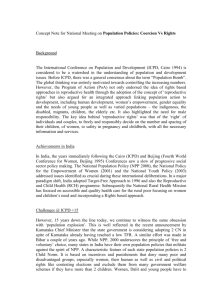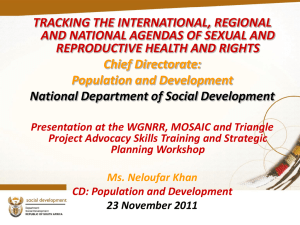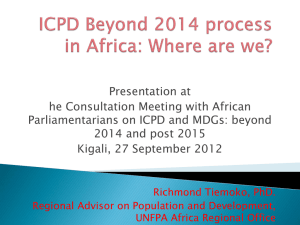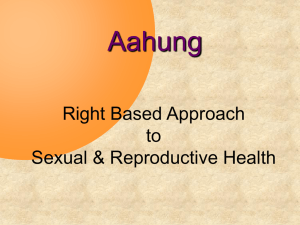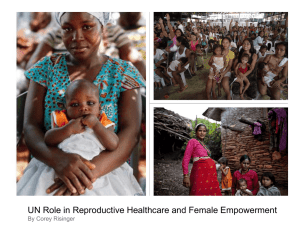Addis Ababa Declaration on Population and
advertisement
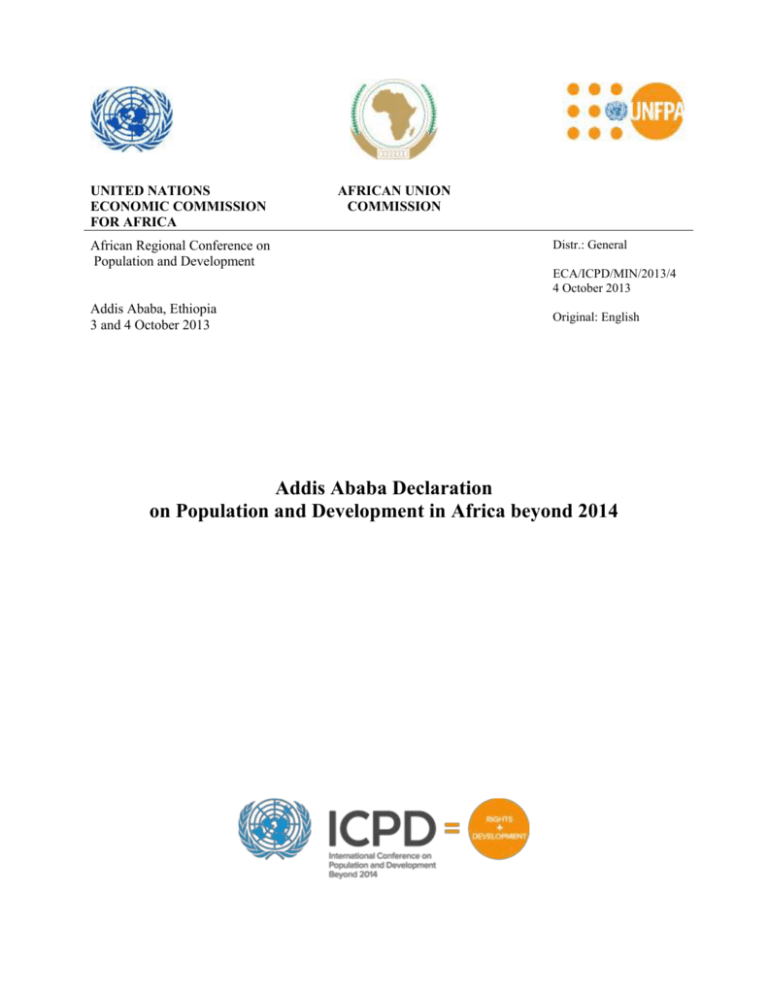
UNITED NATIONS ECONOMIC COMMISSION FOR AFRICA African Regional Conference on Population and Development AFRICAN UNION COMMISSION Distr.: General ECA/ICPD/MIN/2013/4 4 October 2013 Addis Ababa, Ethiopia 3 and 4 October 2013 Original: English Addis Ababa Declaration on Population and Development in Africa beyond 2014 ECA/ICPD/MIN/2013/4 We, African Ministers, assembled in Addis Ababa, Ethiopia, from 3 - 4 October 2013 for the Regional Conference on Population and Development in Africa, to review the implementation of the Programme of Action of the International Conference on Population and Development (ICPD), adopted in Cairo in Africa, in 1994, and its follow-up beyond 2014; Recalling the whole United Nations General Assembly Resolution 65/234 on the Followup to the International Conference on Population and Development beyond 2014, which extended the Programme of Action and the key actions for its further implementation beyond 2014; Taking into account the need to respond to new and emerging challenges relevant to population and development and to the changing development environment, and to reinforce the integration of the population and development agenda in global processes related to development; Further recalling the outcomes of all relevant African Union declarations and resolutions, and decisions of Heads of State and Government including the priorities of the NEPAD programme; the United Nations Conferences and Summits of the 1990s; as well as the outcomes of the ICPD regional reviews undertaken by the United Nations Economic Commission for Africa (UNECA); Reaffirming the Universal Declaration on Human Rights, as well as other international and regional instruments relating to human rights and international law, including the African Charter on Human and Peoples’ Rights, the Protocol on the Rights of Women in Africa, the African Charter on the Right and the Welfare of the Child, and emphasizing the responsibilities of all countries to respect, protect and promote human rights and fundamental freedoms for all, without distinction of any kind; Also reaffirming the Maputo Plan of Action on Sexual and Reproductive Health and Rights, the Continental Policy Framework on Sexual and Reproductive Health and Rights, the Abuja Actions Towards the Elimination of HIV and AIDS, Tuberculosis, and Malaria in Africa by 2030; Recognizing that the full implementation of the Programme of Action and the key actions for its further implementation, including in particular the commitment to achieve universal access to sexual and reproductive health by 2015, is integrally linked to global efforts to eradicate extreme poverty, and ensure sustainable development; Further recognizing the critical inter-linkages between population and sustained economic growth and sustainable development and their central importance to addressing the challenges and priorities of the region especially in improving the quality of life of all people, particularly children, adolescents, girls, youth, women, older persons, groups marginalized on the basis of culture or history or indigenous people, persons with disabilities, migrants, refugees, and displaced persons; in eradicating poverty and social inequities; achieving universal primary and secondary education; achieving gender equality and women’s empowerment; improving maternal and child health; promoting reproductive health and rights; combating sexually ECA/ICPD/MIN/2013/4 Page 2 transmitted diseases including HIV and AIDS; and eliminating gender based violence as well as all forms of discrimination; Noting the findings and conclusions of the review of the implementation of the Programme of Action and its key actions for further implementation of the Programme of Action beyond 2014; Recognizing the progress in policy development, programming, the establishment of institutional structures, the mobilization and allocation of required resources in implementation of all areas of the Programme of Action and its contribution towards achieving the internationally agreed development goals; Acknowledging that considerable gaps still remain in the implementation of the Programme of Action; and these gaps must be taken into account in the implementation of the ICPD Programme of Action beyond 2014, and in the Post-2015 development agenda; Reaffirming the continued relevance and importance of the goals and objectives of the ICPD Programme of Action and the key actions for achieving inclusive growth and sustainable development, peace and security; Conscious of the need for policies, programmes, institutions and partnerships as well as allocations of appropriate resources in order to expeditiously achieve the goals and objectives of the ICPD beyond 2014 as well as the global development agenda beyond 2015; Noting the principles of the Programme of Action including the sovereign right of each country, to implement the recommendations consistent with national laws and development priorities, with full respect for the various religious and ethical values and cultural backgrounds of its people, and in conformity with universally recognized international human rights instruments; We declare: Dignity and Equality Recognizing that despite enormous gains in the realization of human rights in the past 20 years, further efforts need to be exerted to combat poverty and attain fundamental rights and freedoms, without distinction of any kind, that enable people to fully participate in society, benefit from social, economic and technological advancement; Further recognizing that the realization of human potential depends upon guaranteed rights of bodily integrity, including eradication of female genital mutilation/cutting, freedom from violence; the right to development, health, education, employment, shelter and decent livelihoods, through redressing the mal-distribution of wealth and increasing opportunities, ensuring full utilization of human capital to advance socio-economic benefits; ECA/ICPD/MIN/2013/4 Page 3 Acknowledging that high fertility rates in most African countries have led to rapid increase of the youth population and that harnessing the benefits of the youth bulge depends on high level political commitment and provision of sufficient resources towards implementing relevant and appropriate policies and programmes, including enhancing the human capital of young people to ensure adequate capabilities to spur social and economic innovation; Recognizing that our countries are at different stages of the demographic transition, with varying implications for development transformation; We hereby commit to: 1. Develop, strengthen and implement appropriate legislation, national policies and programmes that guarantee and promote human rights, dignity and equality for inclusive sustainable economic and social development in all sectors; 2. Develop, strengthen and implement effective national strategies aimed at eradicating extreme poverty, inclusive growth and economic development, as applicable, that also target disadvantaged groups, especially women, older persons, youth, unemployed persons, people living with HIV and AIDS and persons with disabilities, in both urban and rural areas; 3. Harmonize national legislation with ratified international instruments and accelerate the implementation of the respective national, regional and international commitments on gender equality and women’s empowerment in all sectors and eliminate all forms of discrimination against women and girls; 4. Review, revise, amend or abolish all laws, regulations, policies, practices and customs that have discriminatory impact on women, youth, especially girls, without distinction of any kind, and ensure that the provisions of multiple legal systems comply with international human rights regulations and laws; 5. Increase and enhance the equal participation of women, especially those living in rural areas, in high added value production by increasing their equal access to training and decent work, including, equal pay for equal work, access to social security, paid parental leave, sick and care leave, and other socio-economic benefits, through the design and implementation of gender sensitive budgets with full accountability; 6. Enhance male participation and equal and equitable sharing of responsibilities through support programmes that promote gender equality in rights and opportunities; 7. Enact and implement laws and introduce institutional reforms to ensure economic empowerment of women and young people through equal access to ownership and control of economic resources, technology and markets, including land, property and inheritance rights; ECA/ICPD/MIN/2013/4 Page 4 8. Increase and enhance women’s and youth’s participation in decision-making and leadership positions at all levels through effective implementation of appropriate policies, programmes and affirmative action; 9. Develop and strengthen the implementation of public, civic and adult education programmes which address issues of gender equity, equality and women’s empowerment; 10. Address the needs of all girls, boys and children with disabilities, with regard to their rights to health, nutrition and education at all levels; 11. Address the causes of high school drop-out rates, among boys and girls while creating a conducive environment to enroll those who have never been to school; 12. Create a supportive environment to keep the girl child, including married girls and pregnant girls, in school at all levels of education, and ensure admission or re-entry to school after delivery; 13. Develop and ensure full implementation and enforcement of policies to prevent all forms of child abuse, including school-based violence, violence against girls, sexual violence and harassment and the promotion of safe space programmes for girls; 14. Enact and enforce as a matter of urgency, the legal age of marriage in accordance with Article 6 (b) of the Protocol to The African Charter on Human and Peoples’ Rights on the Rights of Women in Africa; 15. Protect the dignity and rights of women and girls by eradicating all harmful practices, including early and/or forced marriages, female genital mutilation /cutting, through adopting and enforcing laws that prohibit such practices and creating awareness around the harmful health consequences; 16. Adopt and implement legislation, policies and measures that prevent, punish and eradicate gender based violence within and outside of the family, as well as in conflict and post-conflict situations; 17. Adopt and protect the human rights of all individuals, without distinction of any kind, and guarantee equality before the law and non-discrimination for all people, in accordance with national policies, laws, religious, ethical values and cultural backgrounds; 18. Promulgate, where absent, and enforce laws to prevent and punish any kind of hate crimes without distinction of any kind, and take active steps to protect all persons from discrimination, stigmatization and violence; in accordance with national laws and policies; ECA/ICPD/MIN/2013/4 Page 5 19. Provide universal access to affordable quality, comprehensive education and skills development, including retention and completion, in a safe and participatory environment, at all levels of education as well as free elementary education, to adequately respond to labour market needs; 20. Provide equitable access, retention and completion, to comprehensive and quality education for all disadvantaged persons and groups, as well as meeting the learning needs of individuals requiring different pedagogical styles; 21. Provide decent work and appropriate skills for young people through effective policies and programmes that generate employment and sustainable work, consistent with international conventions and regional declarations, to ensure higher social, economic and human development returns from the demographic dividend; 22. Maximize the benefits of the demographic dividend by investing in creating opportunities and a supportive environment for innovation, creativity and entrepreneurship for young people to create and access jobs and realize their full potential; 23. Address and improve the welfare, livelihoods and stability of families and communities and the longevity of people through inclusive social protection policies and programmes; 24. Develop and strengthen family related programmes that would address challenges facing emerging family structures such as female-headed households, child-headed households and households headed by older persons; 25. Promote a culture of respect, support, active and healthy ageing for older persons to ensure that they receive needed long-term care, equitable access to social services, and protection against violence, abuse and social discrimination; 26. Introduce and strengthen policies that promote lifelong learning and facilitate the integration and participation of older persons in society, and benefit from the accumulated life experience and knowledge in all spheres of life; 27. Eliminate child labour and all forms of child exploitation including trafficking, abuse and neglect, and provide adequate care for the development and welfare of children including the establishment of child protection units at the national and sub-national levels; 28. Protect and fulfill the rights of all migrants, including economic migrants, internally displaced people and forced migrants as a result of humanitarian crisis, natural disasters and conflicts and victims of human trafficking, through policy and programmes that ensure their access to work and basic social services as well as enhancing the capacity of security and law enforcement agencies to protect the rights of such persons; ECA/ICPD/MIN/2013/4 Page 6 29. Accelerate the implementation of the provisions of the Convention on the Rights of Persons with Disabilities to ensure non-discrimination and equitable access to basic social services and access to physical environment and structures. Health Recognizing that health is a precondition for economic and social development of Africa and aware that sexual and reproductive health and rights are not only essential to the realization of social justice, but are central to the achievement of global, regional and national commitments for sustainable development; Further recognizing that women’s health is key for Africa’s development and that underinvestment in women’s health remains a challenge; Noting the fragility of the health systems in many countries and the limited access to comprehensive health care services including sexual and reproductive health services; Concerned at the 40 per cent increase in sexually transmitted infections apart from HIV and AIDS since the International Conference on Population and Development in Cairo (1994); Acknowledging the progress made in the implementation of the Abuja Declaration on HIV/AIDS, Tuberculosis and Malaria, the Continental Policy Framework on Sexual and Reproductive Health and Rights and the Maputo Plan of Action for its implementation, the African Health Strategy and the Campaign on Accelerated Reduction of Maternal Mortality in Africa, resulting in reduction in maternal and child mortality and new HIV infections in some countries in the last two decades; Noting the strong link between government commitments and steeper decline in maternal mortality ratio in order to safeguard the lives of women from pregnancy-related complications; Noting that the average contraceptive prevalence rate (CPR) of modern methods in Africa is the lowest among all regions of the world and unmet need for family planning is the highest and that universal access to family planning opens the opportunity to reap the demographic dividend; We hereby commit to: 30. Strengthen health systems, down to the primary health care level, towards the provision of equitable and universal access to a comprehensive range of health care services by ensuring, sustainable health financing and addressing the critical shortage of resources including human resources for health, and infrastructure; 31. Operationalize the right to the highest attainable standard of health by adopting equity and rights based planning and resource-allocation, facilitating community participation in health decision-making and programming, educating health care ECA/ICPD/MIN/2013/4 Page 7 providers and communities on what the right to health means in service provision and ensuring the delivery of health care that is free from stigma, coercion, discrimination, violence and respects human rights, including the rights to confidentiality, privacy, and informed consent; 32. Create a supportive environment to eliminate preventable, communicable and noncommunicable diseases, including HIV and AIDS, sexually transmitted infections, Tuberculosis and Malaria and heart-related diseases and cancers; 33. Intensify efforts to achieve universal access to HIV prevention, treatment, care and support for people living with HIV, and to eliminate mother-to-child transmission; 34. Achieve universal access to sexual and reproductive health services, free from all forms of discrimination by providing an essential package of comprehensive sexual and reproductive health services including through the primary health care system for women and men, with particular attention to the needs of adolescents, youth, older persons, persons with disabilities and indigenous people, especially in the most remote areas; 35. Enact and enforce laws and policies within the national political and legal framework to respect and protect sexual and reproductive health and rights of all individuals; 36. Support the integration of sexual and reproductive health services, HIV and AIDS and family planning; 37. Eliminate preventable maternal mortality and neonatal mortality through ensuring that births are attended by skilled health personnel, and that there is universal access to prenatal and postnatal care and family planning, emergency obstetric and neonatal care, and management of pregnancy-related complications and preventable complications arising from unsafe abortion in order to protect the health and safeguard the lives of women, adolescent girls and neonates; 38. Expand access for all women and adolescent girls to timely, humane and compassionate treatment of unsafe abortion complications and, in accordance with national laws and policies, provide access to safe abortion services; 39. Create supportive conditions to eliminate preventable maternal morbidities, especially obstetric fistula; 40. Adopt and implement relevant comprehensive sexuality education programmes, both in and out of school, that are linked to sexual and reproductive health services, with the active involvement of parents, community, traditional, religious and opinion leaders; and young people themselves; 41. Enact and implement fertility-related policies that promote the rights of individuals and couples to decide freely and responsibly, the number and spacing of their births ECA/ICPD/MIN/2013/4 Page 8 and to have the information and means to do so, taking into account the need for such policies to be based on evidence from research and best practices; 42. Institute measures to prevent unplanned pregnancies through improving access to information, technologies, commodities and services including emergency contraception, that increase the ability of individuals and couples to make free and informed decisions about the number and timing of births; 43. Take deliberate and concerted actions to provide affordable and accurate rapid diagnostic tests (RDT) for HIV, other sexually transmitted infections and reproductive tract infections, as well as information, education, and treatment to all women and men; 44. Put in place measures that facilitate men and boys to access sexual and reproductive health information, counseling and services, promote male participation and equal sharing of responsibilities such as care work, as well as shared decision-making between men and women on sexual and reproductive health; 45. Ensure that all victims/survivors of gender-based violence have immediate and cost free access to appropriate psychosocial and health services, including 24-hour hotlines; treatment of injuries; post-rape care, emergency contraception, and postexposure prophylaxis for HIV prevention; 46. Integrate responses to gender-based violence in all sexual and reproductive health programmes and services including in humanitarian situations, as part of a broader, multi-sectoral, coordinated response, which include maternal and child health, family planning, and HIV-related services; Place and Mobility Recognizing that population dynamics and growth, changing age structure, urbanization, migration and changing household and family structure, influence the opportunities for human development, and are essential to effective planning for inclusive economic growth and social development, as well as for sustainable development; Acknowledging that urbanization could create opportunities for sustainable development and the reduction of poverty, and that without proper policies these potential advantages could pose conditions that lead to vulnerabilities; Recognizing that while the region has contributed little to global greenhouse gas emissions, high population growth will lead to challenges for environmental sustainability and food security, including through environmental degradation, desertification and water depletion, which undermine the efforts to increase food production and to sustain the livelihood of people; ECA/ICPD/MIN/2013/4 Page 9 Reaffirming the right of each individual to the highest standard of living; We hereby commit to: 47. Facilitate free movement of people and goods within countries to foster rural-urban inter-linkages, and regional integration; 48. Adopt selective migration policies, maximize the benefits and minimize the costs and repercussions of international migration, and manage irregular migration; 49. Formulate and adopt evidence-based migration policies, particularly those aimed at vulnerable groups, especially women and youth; maximize the benefits and minimize the costs and repercussions of international migration, and to protect the rights of migrants and citizens; 50. Integrate migration issues in national development plans and strategies; 51. Address, as a priority, the living conditions of people in urban and peri-urban areas through systematic city planning and management while ensuring equal access to quality and affordable basic health and social services for all people; 52 . Ensure equity in access to services by making them sufficiently and geographically available in both urban and rural areas; 53. Develop innovative plans for urbanization and creation of sustainable cities, and incorporate these plans into the national planning frameworks; 54. Promote the social use of space by attending to the land, housing and service needs of the poor, and improve the functioning of land markets; 55. Plan ahead and invest in urban and rural areas by anticipating future growth and population needs, as well as conducting coordinated regional approaches that include peri-urban areas; 56. Develop and strengthen plans, programmes and systems for addressing the needs of people living in fragile ecosystems; 57. Promote the sustainable use of space, by promoting urban growth within a systematic concern for environmental values, minimizing the size and impact of the urban blot, favouring energy-saving and well-integrated mass transportation, as well as density and compact cities; 58. The development of both rural and urban areas in order to strengthen their symbiotic relations in terms of markets and remittances; ECA/ICPD/MIN/2013/4 Page 10 59. Reinforce and establish bilateral, regional and global partnerships on migration to progressively reduce barriers on movement while upholding the fundamental human rights of all migrants, and make migration an instrument of mutual development for the benefit of migrants and countries; 60. Promote policies that foster the integration and reintegration of migrants and returning migrants; 61. Work towards the regional and international portability of acquired benefits and rights from migration; 62. Ensure that migrants have access to secure and low cost remittance transfer options; 63. Forecast the consequences of climate change-related migration in vulnerable areas, especially cities and coastal areas; 64. Fund regular national and regional surveys to ensure current migration data for studying migration and development in the region; 65. Recognize the rights of refugees and guarantee their physical and social protection in conformity with international conventions and work towards facilitating their repatriation to their countries of origin. Governance Recognizing that responsive governance is based on accountability, participation of all, transparency and rule of law and that strengthened governance at the local, sub-national, national, regional and global levels is key to optimal development outcomes, with implications for peace and security; Further recognizing that enabling the voices and interests of all is critical for advancing sustainable development and that responsive governance and accountable institutions are critical for social and economic inclusion and sustainability; Acknowledging the need to integrate population dynamics into development planning at national and sub-national levels in order to comprehensively respond to population and development issues, including population dynamics and its implications for human rights, dignity, quality of life, poverty eradication, and sustainable development; Further acknowledging the urgency of actions needed in the areas of health, education, youth development and employment to translate the demographic dividend for economic growth and development transformation of Africa, taking advantage of Africa’s demographic window of opportunity beyond 2014; We hereby commit to: ECA/ICPD/MIN/2013/4 Page 11 66. Remove barriers to sustainability inter alia through increased use of technology, including innovation, sound governance, systematic awareness creation and sensitization of the public and sustainable consumption behaviour that are beneficial to the environment; 67. Further integrate population dynamics into development planning at the national and sub-national levels in order to comprehensively respond to population and development issues, including population dynamics and its implications for human rights, dignity, quality of life, poverty eradication and sustainable development; 68. Create and strengthen relevant institutions with the necessary capacity to ensure effective integration of population dynamics into development planning with a rights-based approach as well as efficiency and accountability, including ensuring effective coordination of all relevant social and planning bodies; 69. Implement policies where needed that ensure the inclusive and effective participation of the whole society inter alia women, young persons, older persons, persons with disabilities, indigenous people and other marginalized groups in all aspects and levels of governance; 70. Institute monitoring and evaluation mechanisms to effectively assess performance in order to ensure accountability. Data and statistics Noting with concern considerable gaps in the availability and utilization of policy relevant data for planning, monitoring and evaluation, and the lack of timely data on the size, distribution, characteristics and trends of the population of many countries; Further noting that only a few countries in Africa have complete civil registration systems, and that the potential of this source of data is yet to be fully exploited; Acknowledging recent concerted efforts towards improving national civil registration and vital statistics systems in many countries; We hereby commit to: 71. Strengthen national statistical capacity to undertake evidence-based analysis and policy studies, as well as the ability to conduct sound monitoring and evaluation programmes, while increasing investment in the collection, analysis and utilization of population-based data, including population and housing censuses, surveys, civil registration, administrative records, and other studies, together with social, economic and environmental data; ECA/ICPD/MIN/2013/4 Page 12 72. Establish a functional system of civil registration at national, sub-national and community level using existing traditional and local institutions to ensure the availability of relevant data for planning at all levels; 73. Generate, collect, and use quality and timely data from censuses, surveys, vital and civil registration systems, administrative records, studies and research, disaggregated by sex and population groups, for the purposes of planning, monitoring and evaluation; 74. Undertake qualitative and quantitative research and policy studies; 75. Emphasize the importance of collecting data on older persons and persons with disabilities for planning and research, to take into account their specific needs in implementing policies and programmes; 76. Conduct regular national censuses according to international standards, in order to generate timely quality data as an essential component of national and regional development frameworks; 77. Undertake periodic assessment of the national civil registration systems and vital statistics and prepare a plan for needed improvements where necessary. International cooperation and partnership Recognizing that with the deepening of globalization, the issues of population and development have become increasingly intertwined with global economic, social and environmental concerns and that addressing such issues require a multi-stakeholder and international approach; Further recognizing that the rapid expansion in the number of people with enough resources is leading to higher consumption profiles and will increase unsustainable patterns of consumption and production, which will require innovation and change-measures including through market incentives to promote innovation for a green economy; Acknowledge the contribution of the African Union Commission (AUC), United Nations Economic Commission for Africa (UNECA), the United Nations Population Fund (UNFPA), African Development Bank (AfDB) and other development partners in support of the region’s priorities, including for the implementation and review of the ICPD beyond 2014; We hereby commit to: 78. Promote strengthened partnerships with local, national and international civil society organizations in the design, implementation, coordination, monitoring and evaluation of population and development programmes and policies, and encourage the ECA/ICPD/MIN/2013/4 Page 13 promotion of activities directed at increasing the participation and building the capacity of these organizations; 79. Recognize the role of civil society organizations including NGOs and youth in the formulation, monitoring and evaluation of population and development policies and programmes including for achieving the goals of sexual and reproductive health and rights; 80. Promote strengthened partnerships with the private sector in the design, implementation, coordination, monitoring and evaluation of population and development programmes and policies, in particular in the areas of service delivery and commodity production, security and distribution; 81. Promote international cooperation efforts, including the development of joint programmes and initiatives, the strengthening of policy dialogue and coordination, the transfer of knowledge and technology, and the allocation and mobilization of financial and technical resources, for international cooperation in the area of population and development. Implementation The Conference reflects high political commitment on the part of the 53 African Countries present at the Conference to the implementation of the ICPD Programme of Action on the Continent; the achievements and significant progress made need to be sustained, and in order to do so as a region and achieve the goals and objectives of the Addis Ababa Declaration, we commit to: 82. Mainstream the Addis Ababa Declaration on Population and Development in Africa beyond 2014 into the work plans of the bodies of the African Union and United Nations Economic Commission for Africa; 83. Also mainstream the inclusion of the Addis Ababa Declaration in the Post-2015 development agenda; 84. Monitor regularly the achievement of the goals of the Declaration in the context of reporting on the post-2015 development agenda; 85. Conduct sound monitoring and evaluation of this Declaration based on reliable population data, projections, and consideration of future scenarios; 86. Enhance coordination and cooperation among government departments dealing with population and development matters for harmonizing population and policy within sectoral policies on education, youth and health and the need to build capacity and provide funding to national and regional population programmes; ECA/ICPD/MIN/2013/4 Page 14 87. Periodically review the outcomes of the African regional conferences on ICPD beyond 2014; 88. In doing so, we take into account the concerns of all strata of the continent’s stakeholders – including the public sector; private sector; civil society including NGOs, faith-based organizations, youth, women, trade unions and academia; Members of Parliament; and regional and subregional development institutions.
